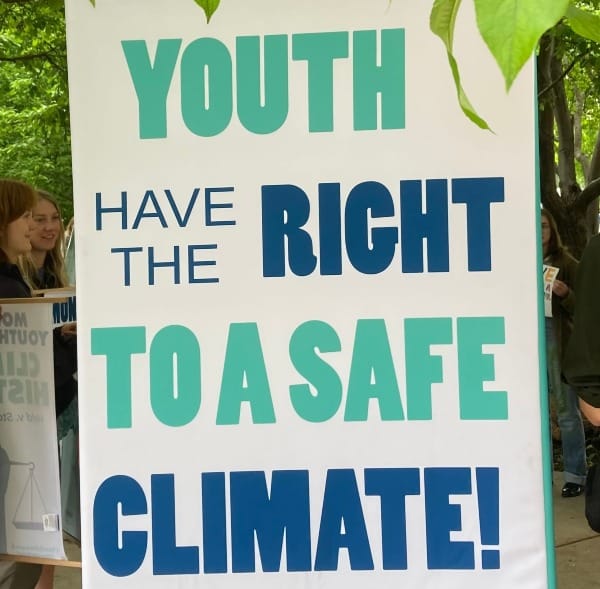Hoboken, New Jersey Sues Oil Industry For Climate Impacts From Its 'Deceptive Actions'

Story originally published by DeSmog
New Jersey has now joined the wave of lawsuits seeking to hold the fossil fuel industry accountable for climate impacts. The city of Hoboken today filed a case against major oil and gas companies and the American Petroleum Institute (API), a powerful industry trade group which has played a major role in promoting “uncertainty” about climate science.
The lawsuit seeks to recover costs associated with climate impacts like extreme flooding and sea level rise. Like other climate liability lawsuits targeting fossil fuel companies, Hoboken's suit alleges that the oil and gas companies and their lobbying group not only knew early on about the climate harms resulting from their products, but actively engaged in campaigns of deception to undermine climate science and avoid policy responses.
“Here in Hoboken, we are now paying the price for these deceptive actions,” Hoboken Mayor Ravi S. Bhalla said during a press conference held Wednesday, September 2. “We cannot sit idly by and let Big Oil continue profiting at the expense of Hoboken residents.”
Defendants named in the Hoboken lawsuit include BP, Chevron, ConocoPhillips, ExxonMobil, Shell, and Phillips 66, plus the largest trade association in the U.S. for oil and gas, API. This lawsuit is the second climate case in recent months targeting API specifically. The Big Oil trade association is also a defendant in a lawsuit filed June 24 by Minnesota Attorney General Keith Ellison.
Hoboken's lawsuit points to the long history of the oil and gas industry's knowledge of the potentially damaging impacts of its products on the climate, and the differences between what they came to say about the issue publicly versus privately over time. It cites Frank Ikard, API President in 1965, when he delivered a dire warning about a report on climate change during an oil industry conference: ”[T]here is still time to save the world’s peoples from the catastrophic consequences of pollution, but the time is running out.”
But decades later, API's approach toward climate change had evolved. The lawsuit quotes a 1998 internal action report in which API says, “Unless ‘climate change’ becomes a non-issue … there may be no moment when we can declare victory for our efforts.”
API did not immediately respond to requests for comment from DeSmog.
According to Hoboken’s legal complaint, “Defendants, some of the world’s largest fossil fuel companies and their largest trade association, have known for more than a half-century that the fossil fuels they extract, produce, market, and sell on a massive scale are causing accelerating climate change that poses grave threats to society — sea level rise, extreme heat, and increasingly destructive storms, among many others. Instead of addressing those threats, Defendants have spent the last fifty years deceiving the public about their central role in causing climate change in order to grease the wheels of their ever-expanding production and sale of fossil fuels.”
The lawsuit includes legal claims of public and private nuisance, trespass, negligence, and violation of New Jersey’s Consumer Fraud Act. The city is seeking monetary damages — in other words, demanding that the oil companies help pay for climate-related costs that otherwise are saddled onto taxpayers.
Exxon spokesperson Casey Norton told DeSmog, “This suit does nothing to advance meaningful actions to reduce the risks of climate change. The claims are baseless and without merit. We look forward to defending the company in court.”
“We want to be compensated for the costs of climate damages both past, present and future,” Mayor Bhalla said. Hoboken has already spent hundreds of millions of dollars on resiliency projects, he explained. According to a 2019 study by the Center for Climate Integrity, Hoboken’s estimated costs for sea walls alone by 2040 will add up to $27.9 million, while the cost for sea walls in Hudson County (which includes Hoboken) is estimated at $505 million.
Mayor Bhalla said climate resiliency must emphasize protecting the city’s most vulnerable residents, such as people of color and lower-income families who tend to be disproportionately impacted by fossil fuel pollution and climate disasters like Hurricane Sandy, which devastated the New Jersey coast in 2012. “This is a racial justice issue,” he said.
Hoboken filed its climate lawsuit on September 2 in Hudson County Superior Court, which is a New Jersey state court. Similar climate cases filed by states and municipalities have been embroiled in jurisdictional battles, with fossil fuel companies determined to move the cases to federal courts where they see an easier path to dismissal. None of these climate accountability cases have made it to trial yet, with the exception of a securities fraud case filed by the state of New York against Exxon. A judge dismissed that case last December.
“We fully recognize that a legal decision may not come down for some time,” Mayor Bhalla said during the press conference. He explained that the city is “joining the fight” now for the sake of the younger generations of Hoboken residents.
“We don’t believe it is hyperbole to say that what Hoboken, the nation, and the world are facing is an existential threat,” said Jonathan S. Abady, an attorney with the New York City law firm Emery Celli Brinckerhoff Abady Ward & Maazel LLP, which is providing legal representation for Hoboken at no cost to the city.
“Time is of the essence,” Abady said. “And time is running out.”


